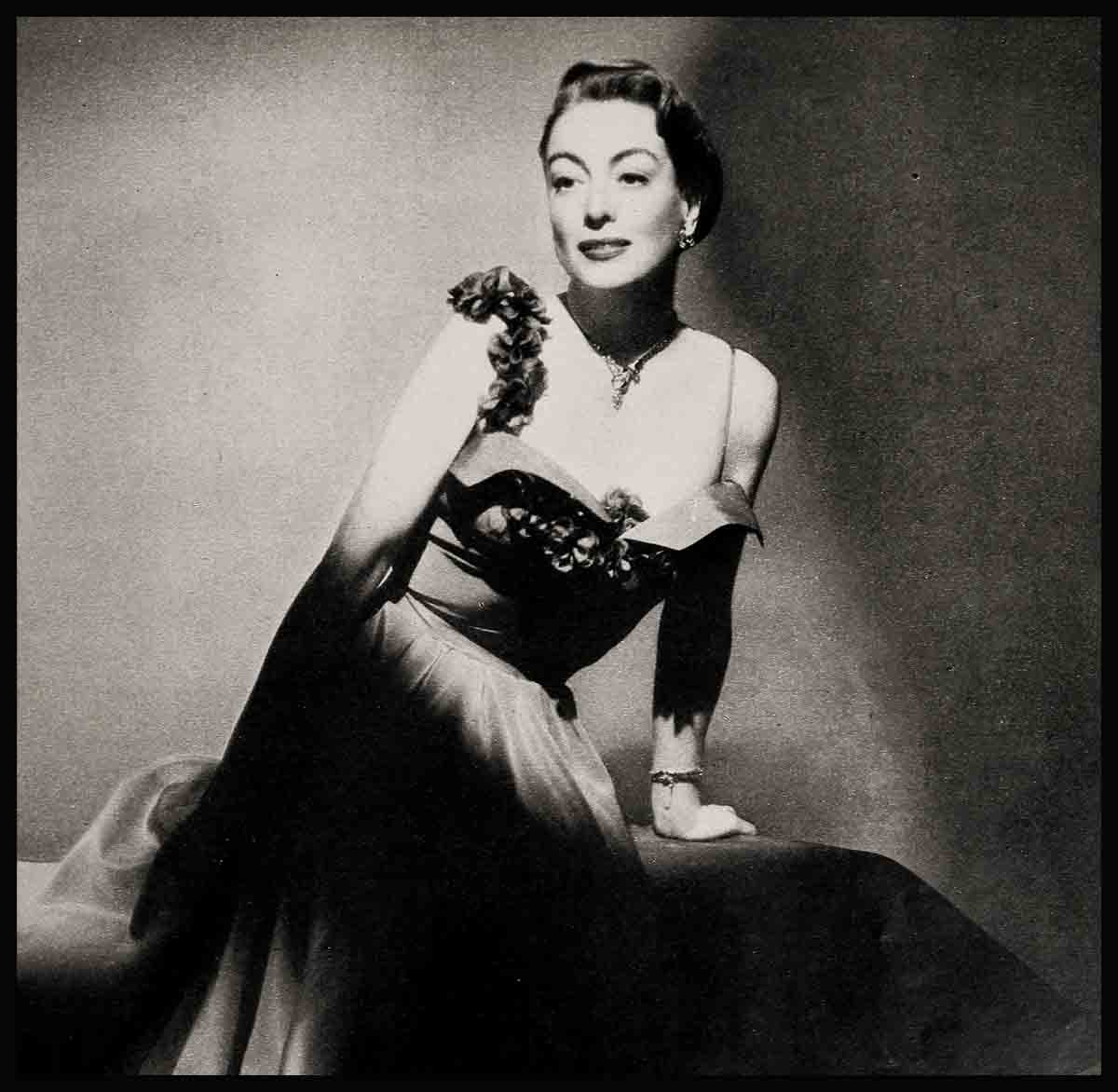
The Joan Crawford Myth
Joan Crawford invented herself. She made herself up right out of whole cloth and now she is torn between being pleased with the result and feeling inadequate. She didn’t make up her background, nor does she try to conceal it. The early days in Kansas City when she lived in the back room of a laundry, the schooldays which were all work for tuition and no time for study, the rough New York chorus girl days, the time at Stevens’ College when she was rejected by a sorority because the other girls found out she was working her way through as a waitress. . .
She felt the need of a personality change. Although she cried when her real name, Lucille Le Sueur, was changed to Joan Crawford she immediately began to become Joan Crawford the film star. As such she has a tremendous feeling of responsibility toward the public who’ve made her what she is. But what, indeed, is she?
She’s a woman who needs constant and daily praise to build up her faltering ego. When Franchot Tone was married to her, he once remarked, “Joan is hurt if I don’t tell her how gorgeous she looks every time she walks down the stairs for dinner. Well, she does look gorgeous. But so does a sunset and you can’t keep saying every night, ‘How gorgeous is the sunset.’ ”
An ex-executive of the Capitol Theater in New York tells this story. It happened when Joan was at the height of her career.
She was in New York at the same time that a new movie of hers was playing at the Capitol. Her fans waited in line for hours fighting and scratching to be the first to get in when the doors opened at 10:30 A.M. “It’s a different kind of audience from any you have ever seen,” the executive told Joan.
Naturally Joan had to see and hear this but, he warned her, “It’s as much as my job is worth and as much as your life is worth if those mad, crazy kids get a whiff of you.”
Joan promised she would come disguised and he agreed to slip her in at the side entrance. But when Joan arrived she was wearing a big fur coat, the Crawford glamor bob, a big hat and even gardenias—her trademark flower in those days. Her silhouette was unmistakable even in the dark and two minutes later she was mobbed. Police had to be called to get her away from the theater in one piece.
Joan had really wanted to see her movie with that audience. But it was psychologically impossible for her to step from her car into a restaurant, a shop, or a theater filled with wild fans unless she was Joan Crawford. And to be Joan Crawford she had to look like Joan Crawford.
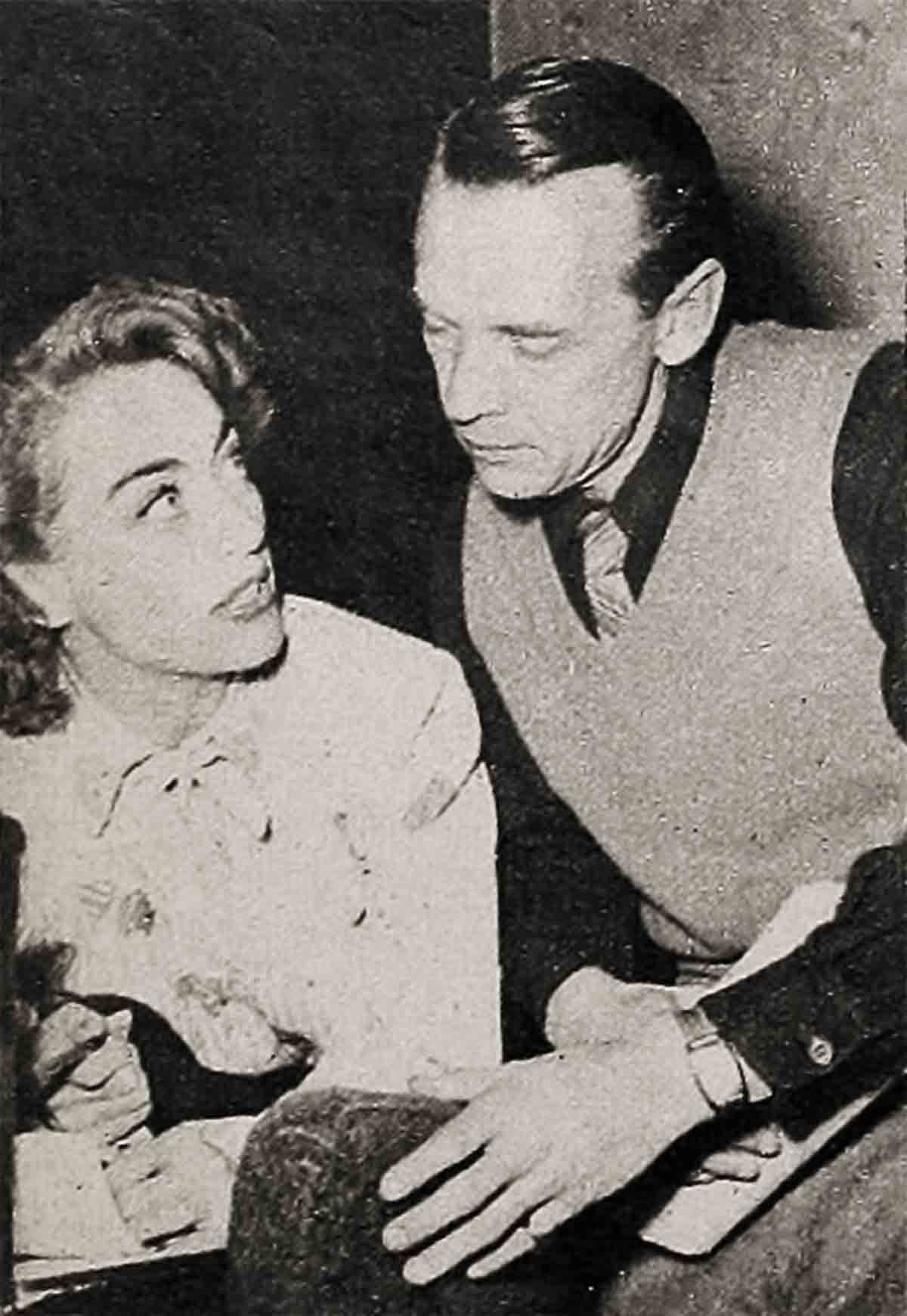
She wants everything. She says she wants a good marriage most of all and she claims that the failure of her three marriages was her own fault. “I gave both the men and the marriage too much,” she says. “I wanted the perfect marriage but I knew that in Hollywood this is difficult to achieve. So I was going to show them I could do it . . . Well, I showed them.”
But, if you will examine the record, you will see that she worked not harder but more purposefully on her career. When this career fell into the doldrums and her agent told her he couldn’t find a job for her, Joan fired him and got herself a part in Mildred Pierce. It won her the Academy Award.
Joan was ill the night those awards were given out. Dramatically, her picture with the Oscar was taken at her bedside. She was criticized for not appearing at the Academy, sick or well, the way other stars who are nominated do. But psychologically it was impossible for Joan to go unless she was sure she would receive the award. Just as she always feels much more at ease in her own home than at other people’s parties.
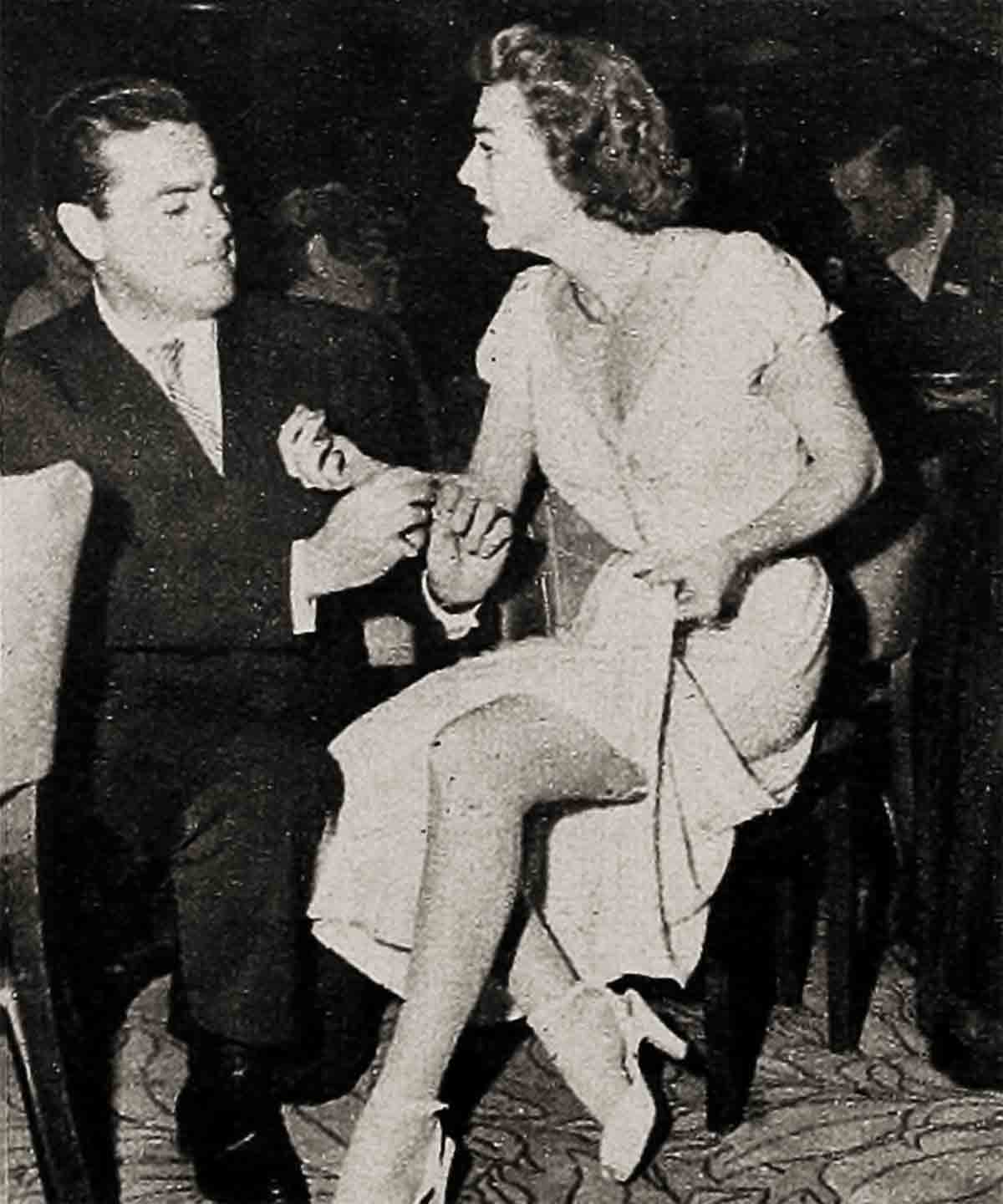
Joan has handled her career as a movie star magnificently. Her career as a wife has not been so good. Actually she gave her husbands too much attention. When her husband was working on a film and she was not, she’d get up at the crack of dawn to prepare a lunch because she didn’t want him to eat the studio food. Commissary food is sometimes bad but who wouldn’t prefer kidding around with his fellow actors at noon to sitting alone in his dressing room? This desire to serve her husband stemmed from a good motive but Joan smothered him with kindness!
She needs love and romance. “I’m lonely,” she says, but then she adds, “So what? Lots of people are lonely. I have a lot more than most lonely women.”
She is a romantic. She says that her ambition is to “fulfill myself as a woman.” But Joan has rigid ideals. She sometimes thinks she envies the girls who take their fun where they find it but Joan’s spiritual qualities inevitably form her way of life. This being the case, it’s hard for her to find a husband.
A charming, personable young man wooed her, recently, with delightful notes, cute telegrams and silly gifts. (Joan loves surprise packages. It doesn’t matter whether the present comes from Cartier’s or the ten cent store, she’s like a kid when you give her something to open, something new to explore.)
This admirer couldn’t have been more delightful and the notes and wires and silly presents were all in perfect taste. One of the notes told her that his ambition was to meet her and, he said, one day he would find a mutual friend who would introduce them. He found the mutual friend and he was, finally, properly introduced.
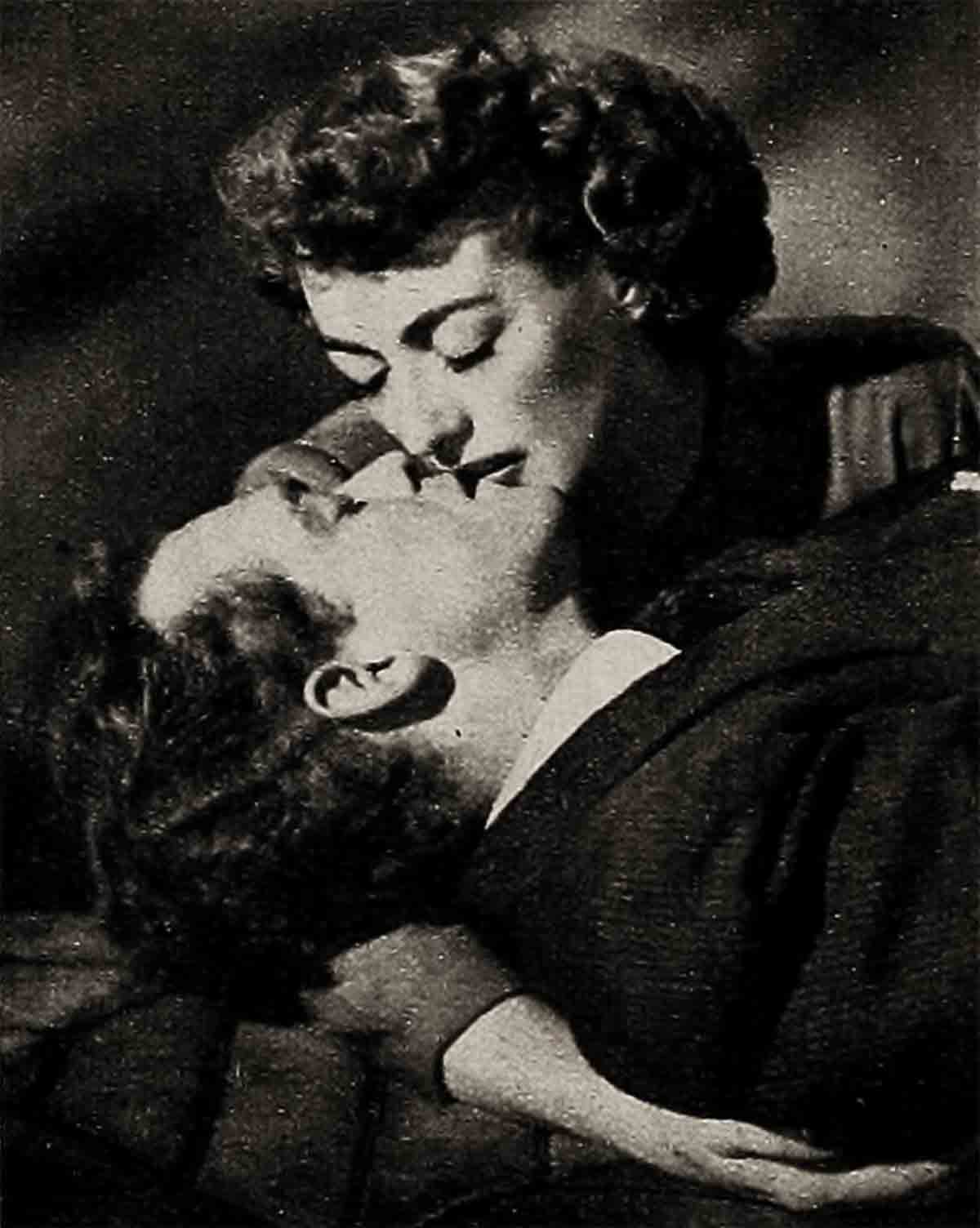
Then he promptly asked for a role in one of her films!
Cesar Romero—better known to his friends as Butch—is an old friend of Joan’s. Butch is a wonderful dancer and when he and Joan get on the floor other couples form a ring around them to watch the poetry of motion they create. But Cesar is no romantic interest to Joan and that’s why she was so amazed when, one day, the press started calling madly. There was a rumor that she and Butch had had a big fight on New Year’s Eve.
“Me? Fight with my Butch? Why, that’s why I’ve known Butch all these years. Because we don’t fight,” she said.
She told the columnist what had happened. They had gone to the New Year’s Eve party. Joan had collected all the leftover horns and funny hats to take home to her children. She had danced a lot and at two o’clock she had begun to yawn. Joan is an early-to-bed. But Butch was having a ball and, she didn’t want to spoil his fun so she decided the only sensible thing to do was to take a taxi and go home with the horns and funny hats for the kids.
At one time it seemed as if she were in love with Greg Bautzer. This was a wild and stormy romance. Neighbors reported that when the gates were locked against him Greg, his hands bleeding, scaled the garden wall. Joan would vow she’d never see him again, but then he would make some impetuous gesture or tell her how much he needed her advice—and she’d relent. But Joan does not thrive on off screen drama. Quite the opposite—she is always searching for peace.
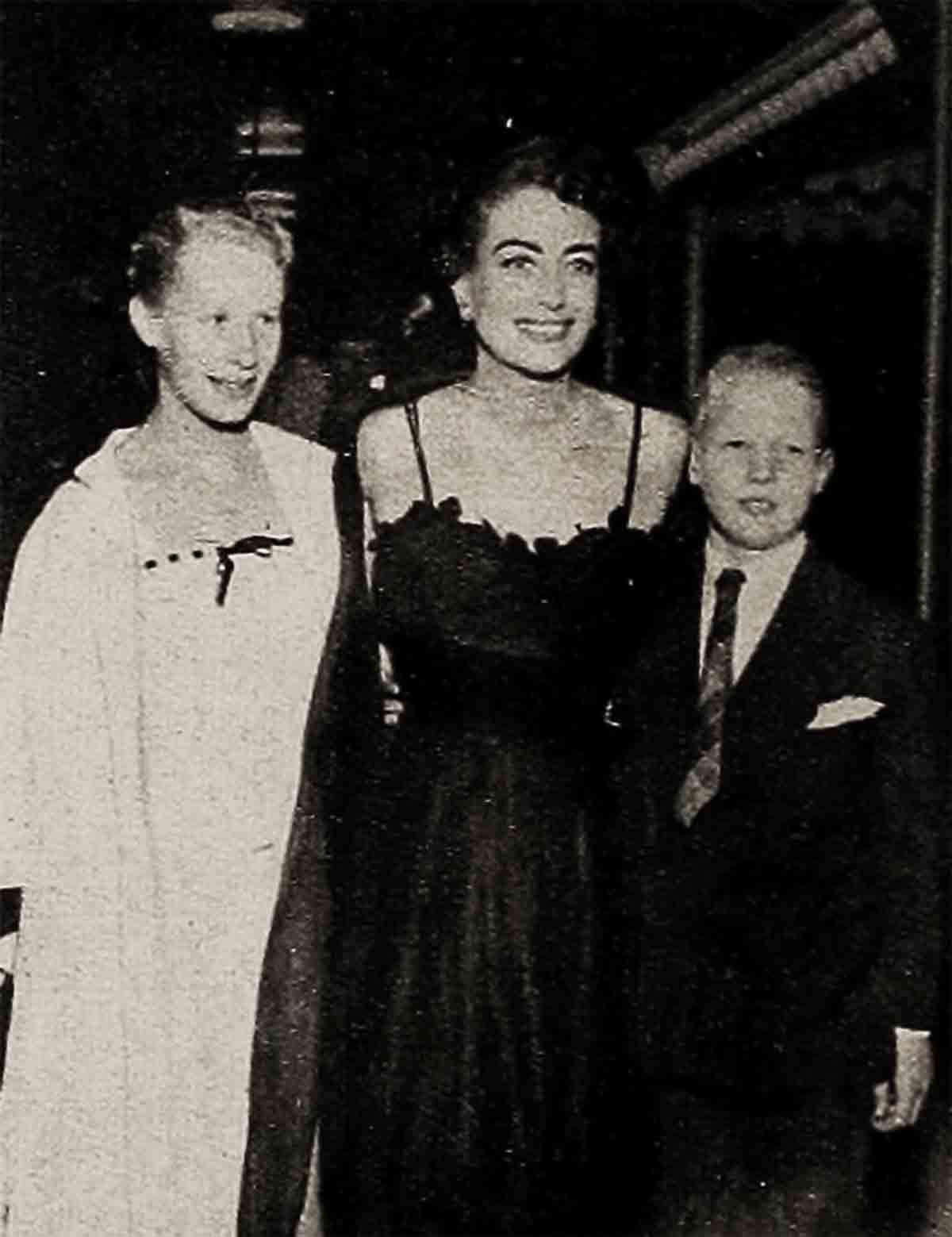
Today Joan says, “I’ve been enormously lucky during my life time. Yet every now and again things pile up and up and up and the flood gates open and I cry my eyes out alone. Which is not conducive to good photography the next morning. When a woman’s blue she’s told to go out and buy a hat or change her hair-do. But I have three hats and never wear them and I’ve cut off practically all my hair. It doesn’t do any good.”
Joan has put the full force of her energy into her four adopted children. But she has learned that even that can be a frustrating experience. A woman has a great desire for children. But they are babies for such a little time, and are quick to show their independence. You want to be their friend, give them the benefit of your own experience, and when they won’t accept that you’re baffled. Kids resent discipline when they are striving to be independent, so mother, to them, becomes not a friend but a dictator. “I’ve had to learn,” Joan said, “that my children must go through this.”
Joan never criticizes her children for publication. But because her name is newsworthy she was caught in a trap when Christopher, a high-spirited, handsome boy, ran away from home. Joan reported this to the police, and immediately, reporters and photographers flocked to her door to record the episode and whatever words—foolish or wise—the distressed mother said.
This publicity was bad for Christopher. It gave the episode an importance it did not merit. After the event he told a friend, “I guess I’ll run away and get my name in the papers again.”
Joan believes that if her children disobey the law they should have some privilege taken away from them just as an adult who disobeys the law has his freedom taken away from him. Joan believes that if a parent is playing a game with a child the child should not be allowed to win, intentionally. “You don’t always win in life,” she says. “Sometimes you win. Sometimes you lose. You learn that.”
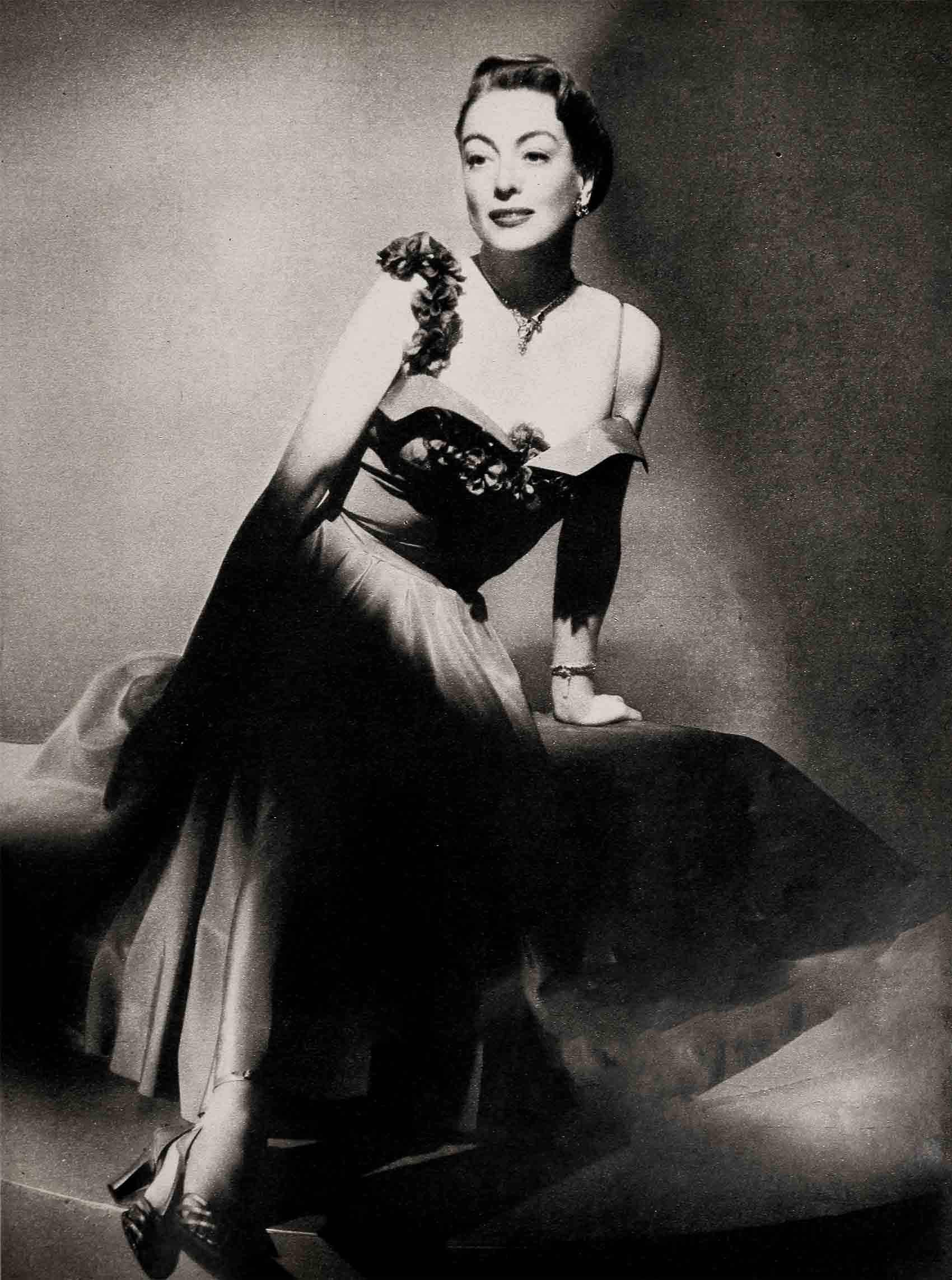
Not too long ago Christina, now 12, came to Joan and said, “I hear you used to be quite a Charleston dancer, Mother.”
Joan repressed the smile. Was she a Charleston dancer? Why, when she wasn’t doing the Charleston in her movies she was winning cups at the Cocoanut Grove night after night.
“I can Charleston,’ Christina said.
“I’m sure you can, darling,” Joan said.
Christina gave her version of the Charleston and Joan applauded. Then Tina asked her mother to dance for her. Joan did the prettiest, easiest, most rhythmic Charleston the eyes of man have ever seen.
“Did you really do it that way?” Tina asked. Joan knew, of course, that this was the child’s typical amazement at discovering that a parent can do anything well. Later Joan said, “If I hadn’t lived off those cups I could have shown them to her.
This is the kind of honesty Joan Crawford has. And the kind of humor. But about herself as herself she has no humor. She says funny things that are funny but since she is her own conception of a movie star she must take herself seriously. Also she knows that movie stars must work.
Joan has two full time secretaries at her house and another away from the house. She is the only star who has personally dictated an answer to every fan letter received over the years. During the last World War she had a file of over 5,000 boys’ names to whom she wrote regularly every week. This Christmas she sent out over 12,000 Christmas cards. When she is not on a picture she spends her time reading scripts and dictating. When she is working at the studio she has one of her secretaries come to take letters between scenes and for a couple of hours after the day’s shooting is ended.
She works hard on the set, too. She has never been late in her life. She still puts on her own makeup. Nothing is too tedious for her to do if it will help the picture. Joan believes it is a good thing to be a movie star. And she has no patience with any girl in pictures who doesn’t think so, too. As witness her attitude toward a new, untried girl who was given a good role in one of Joan’s movies.
This girl looked down her nose at movies. She yearned to go “back to the theater,” where she had never been. She thought Hollywood was just a good racket, a way to make big money. Also this girl was sloppy and Joan is immaculate both in her home and away from it. And besides, as Joan said, “she was rude to hairdressers, cameramen, makeup men, wardrobe women.” This is something Joan can’t tolerate. Joan always loves her crew and they reciprocate.
When the last day of shooting arrived everybody kissed Joan and she kissed everybody, and everybody was sad because they had finished a pleasant engagement. At last the girl came up to Joan. “Have you any advice to give me, Miss Crawford?” She asked. Joan, who is noted for giving good advice to earnest newcomers, gave her a long, level look, “Yes, indeed,” she said, “I have some advice for you. Enjoy yourself while you can for I don’t think you’ll be with us very long.c
“I’ve seen them come and go,” Joan said later. “And this un-cooperative, rude, sloppy type goes faster than it comes.”
I est the movie star, is perfect. But faced with the reality of marriage, parenthood and day to day living she must know frustrations since she has to leap from the real to the make believe that has now become real. So she has thrown herself wholeheartedly into her new film Sudden Fear.
Sudden Fear is an independent film and she will participate financially in it. Contrary to what the public thinks Joan Crawford is anything but rich. In fact, at the moment, she is badly off financially. She has earned a fortune and lost it in real estate because she took an expert’s advice.
To sum up this remarkable woman’s character you must remember that for years magazines have printed stories called “The New Joan Crawford.” Is she a new person every year? Hear what she has to say on the subject. “There has never been a new Joan Crawford. All the Joan Crawfords are me. I just grew faster and my growing pains were more acute, somehow. Why, all of a sudden I’d meet someone I didn’t know and Id say, ‘Why, that’s me.’ It wasn’t a new me, it was me finding new things in me and finding how to use them. These new things were always a part of me but I just didn’t know it. I’d think I had finished growing and then there would be those growing pains suddenly. And I’d be surprised because I didn’t expect them. I’m still surprised about that.”
All these years Joan has been trying to blend the woman she could have become with the woman she made herself become. It’s a neat trick. That she has not quite accomplished this blend of personalities accounts for Joan Crawford as she is today.
THE END
—BY CAROLINE BROOKS
It is a quote. MODERN SCREEN MAGAZINE JULY 1952





No Comments